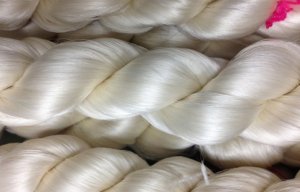
Kraig Biocraft expands its IP portfolio
Genetically engineered spider silk-based fibre technologies nearing commercialisation.

17th February 2022
Innovation in Textiles
|
Ann Arbor, MI, USA
Kraig Biocraft Laboratories has just filed two key US patents relating to the development of recombinant spider silk, and has also delivered a consignment of its Dragon Silk yarn to Spydasilk Enterprises in Singapore.
In its US patent entitled Synthesis of High Molecular Weight Proteins Using Inteins, Kraig, headquartered in Ann Arbor, Michigan, reinvents its approach to manufacturing large-format spider silk protein with new technology allowing for the automated self-assembly of target proteins within the silkworm. The process allows for the opportunity to reach beyond the limits of current protein synthesis technologies.
This new approach, using the auto-processing capabilities of inteins – genetic elements that disrupt the coding sequence of genes – creates the opportunity to create plug-and-play blends of numerous spider silk proteins that are not inhibited by the current size limitation for targeted gene knock-in knock-out transformations.
Sericin
The second patent, Synthesis of Non-Native Proteins in Bombyx Mori by Modifying Sericin Expression, moves beyond heavy chain fibroin and creates opportunities for the co-production of non-fibrous proteins within sericin. Sericin is the stick glue-like protein holding the silk fibres together, making up roughly 20% of the cocoon, and is broadly considered a waste product.
This invention seeks to leverage the untapped resource to increase the production of target proteins. Target materials include a range of possible applications, including therapeutic and pharmacological proteins. The current production systems for these proteins are inefficient and, therefore very expensive. This new process opens the possibility for large-scale production materials such as elastin, keratin, human collagen and many more at comparatively very low costs.
“Our research team continues to deliver novel and innovative applications for our gene-editing technologies,” said COO Jon Rice. “While our production operations in Vietnam remain laser-focused on the large-scale commercial production of spider silk textiles, our lab is busy executing on the technology roadmap to secure our future and legacy.”
Dragon Silk
Spydasilk Enterprises, the Singapore-based joint venture between Kings Golden Harvest and Kraig Labs focused on the commercial sale of luxury streetwear and apparel, has meanwhile received a delivery of Dragon Silk yarn
Spydasilk plans to process the recombinant spider silk yarn, into premium fabrics and garments and expects to make these products available through a combination of direct sales and traditional retail channels.
“This first small shipment of Dragon Silk will be used to develop the first fabrics in the Spydasilk family of products,” said Rice.
“We are thrilled with the arrival of the Dragon Silk samples in Singapor,” added Spydasilk and Kings Group marketing director Dai Jiajun.

Business intelligence for the fibre, textiles and apparel industries: technologies, innovations, markets, investments, trade policy, sourcing, strategy...
Find out more